

At a glance. Dr.
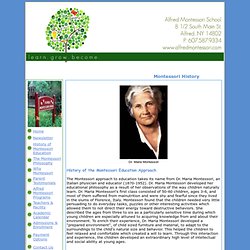
Maria Montessori History of the Montessori Education Approach The Montessori approach to education takes its name from Dr. Maria Montessori, an Italian physician and educator (1870-1952). Dr. The Montessori Education Method Maria Montessori expanded her study of the young child, and gradually refined her approach to all child development areas through her experience and research in countries as diverse as Spain and India until the time of her death in 1952.
Influences. Johann Heinrich Pestalozzi. Johann Heinrich Pestalozzi (January 12, 1746 – February 17, 1827) was a Swiss pedagogue and educational reformer who exemplified Romanticism in his approach.
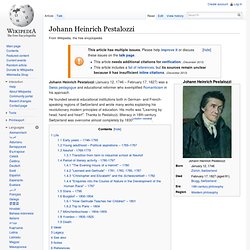
He founded several educational institutions both in German- and French-speaking regions of Switzerland and wrote many works explaining his revolutionary modern principles of education. His motto was "Learning by head, hand and heart". Thanks to Pestalozzi, illiteracy in 18th-century Switzerland was overcome almost completely by 1830[citation needed]. Life[edit] Early years – 1746–1765[edit] Coat of arms of Pestalozzi's family from Zürich Pestalozzi was born on January 12, 1746, in Zürich, Switzerland. On holidays Pestalozzi would visit his maternal grandfather, a clergyman in Höngg.[3] Together they would travel to schools and the houses of parishioners. Pestalozzi was educated to become a clergyman. Young adulthood – Political aspirations – 1765–1767[edit] Neuhof - 1769-1779[edit] Period of literary activity - 1780-1797[edit] Friedrich Fröbel. Friedrich Wilhelm August Fröbel (or Froebel) (German pronunciation: [ˈfʁiːdʁɪç ˈvɪlhɛlm ˈaʊɡʊst ˈfʁøːbəl]; April 21, 1782 – June 21, 1852) was a German pedagogue, a student of Pestalozzi who laid the foundation for modern education based on the recognition that children have unique needs and capabilities.
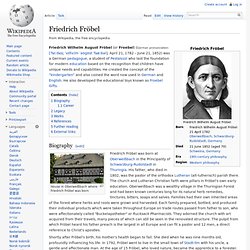
He created the concept of the “kindergarten” and also coined the word now used in German and English. He also developed the educational toys known as Froebel Gifts. Biography[edit] Édouard Séguin. Édouard Séguin (1812-1880) Édouard Séguin (January 20, 1812 - October 28, 1880) was a physician and educationist born in Clamecy, Nièvre.
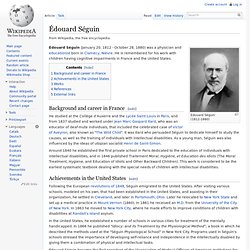
He is remembered for his work with children having cognitive impairments in France and the United States. Background and career in France[edit] He studied at the Collège d’Auxerre and the Lycée Saint-Louis in Paris, and from 1837 studied and worked under Jean Marc Gaspard Itard, who was an educator of deaf-mute individuals, that included the celebrated case of Victor of Aveyron, also known as "The Wild Child". It was Itard who persuaded Séguin to dedicate himself to study the causes, as well as the training of individuals with intellectual disabilities. Around 1840 he established the first private school in Paris dedicated to the education of individuals with intellectual disabilities, and in 1846 published Traitement Moral, Hygiène, et Education des Idiots (The Moral Treatment, Hygiene, and Education of Idiots and Other Backward Children).
Works[edit] Jean Marc Gaspard Itard. Jean Itard Jean Marc Gaspard Itard (April 24, 1774, Oraison, Alpes-de-Haute-Provence – July 5, 1838, Paris) was a French physician born in Provence.[1] Without a university education and working at a bank, he was forced to enter the army during the French Revolution but presented himself as a physician at that time.[2] After successfully working as an assistant physician at a military hospital in Soliers, in 1796 he was appointed deputy surgeon at Val-de-Grâce (Hôpital d'instruction des armées du Val-de-Grâce) military hospital in Paris, and in 1799 physician at the National Institution for Deaf Mutes.
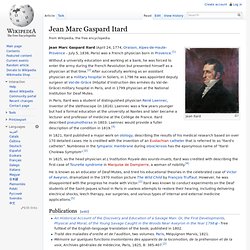
In Paris, Itard was a student of distinguished physician René Laennec, inventor of the stethoscope (in 1816). The Montessori Method. Education As Peace. Concrete to Abstract. Prepared Environment. Control Of Error. Child Scaled. Athentic Work. Teacher as Guide and Observer. Structure and Order. Freedom. Follow the Child. Absorbant Mind. Control Of Will. Learning Community. Knowledge Building.